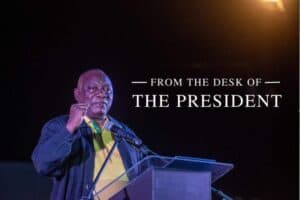However, the public protector may still come up short when it comes to ruling on the intention of money laundering.

Public Protector Busisiwe Mkhwebane is spot-on with her findings that President Cyril Ramaphosa was required to declare donations to his ANC presidential campaign, as he was a member of parliament at the time, constitutional experts have said.
Mkhwebane last week found that Ramaphosa was bound by the code of ethical conduct and disclosure of members’ interests for assembly and permanent council members to declare all the donations.
Advocate Paul Hoffman, director and founder of Accountability Now, said Ramaphosa was an MP at the time of the donations and could not be allowed to escape a sanction and rebuke simply by becoming president.
“He cannot escape by simply going upstairs and becoming a president. The disclosure regime in terms of the ethics code applies to him,” said Hoffman.
“That it was a personal campaign does not absolve him from saying, ‘I have had donation from the following people.’ This is meant to stop business people from owning politicians.”
According to Hoffman, Ramaphosa’s argument that Mkhwebane had no business probing his CR17 campaign and making findings, as her powers are limited to issues concerning public administration and the improper exercise of public or statutory powers, and that the campaign and its fund-raising operations did not concern the public, was flawed.
He said this argument would not help Ramaphosa because “his funding has to be disclosed”.
Hoffman criticised the argument that the public protector’s findings could be interpreted to include party political funding in general and that parties must reveal their donations and sources.
He said that in Ramaphosa’s case, the funding was not for the party to campaign for elections against other parties but was for a campaign within the party.
However, Hoffman said the disclosure part was the only finding and remedial action he agreed with, saying the ruling that Ramaphosa should be investigated for money laundering was simply wrong.
Mkhwebane found there was prima facie evidence that money laundering could have taken place with the R500,000 donation from Bosasa to his campaign and that the money was transferred to the Cyril Ramaphosa Foundation account, from where it was also transferred to other beneficiaries.
She found that the money went through several intermediaries, instead of going straight to the CR17 campaign.
But Hoffman said that for someone to make themselves guilty of money laundering meant that person had criminal intent.
“[Ramaphosa ] can’t be found guilty of money laundering, which requires criminal intent. The fact that he tried to give the money back demonstrates that he had no criminal intent,” Hoffman said.
He said it was also incorrect for Mkhwebane to say Ramaphosa deliberately misled parliament, saying she seemed to confuse “wilfully and inadvertently”.
University of SA’s constitutional law expert Professor Shadrack Gutto agreed with Hoffman that Ramaphosa should face the music for his failure to declare the donations.
“It shows her level of understanding regarding the separation of powers. He was a member of the executive and the executive is answerable to parliament,” he said.
For more news your way, download The Citizen’s app for iOS and Android.






